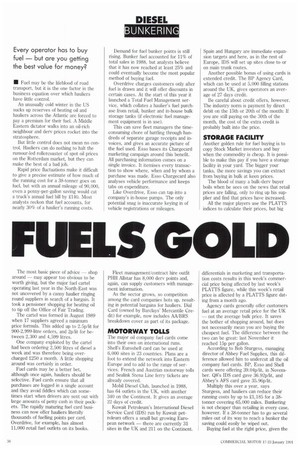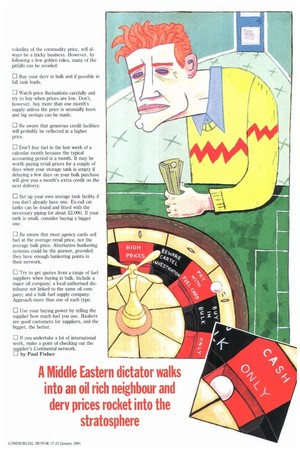LS GOLD
Page 46

Page 47

If you've noticed an error in this article please click here to report it so we can fix it.
Every operator has to buy fuel — but are you getting the best value for money?
• Fuel may be the lifeblood of road transport, but it is the one factor in the business equation over which hauliers have little control.
An unusually cold winter in the US sucks up reserves of heating oil and hauliers across the Atlantic are forced to pay a premium for their fuel. A Middle Eastern dictator walks into an oil-rich neighbour and dery prices rocket into the stratosphere.
But little control does not mean no control. Hauliers can do nothing to halt the rumour-led rollercoaster of spot oil prices on the Rotterdam market, but they can make the best of a bad job.
Rapid price fluctuations make it difficult to give a precise estimate of how much of the running cost for a 38-tormer goes on fuel, but with an annual mileage of 90,000, even a penny-per-gallon saving would cut a truck's annual fuel bill by £140. Most analysts reckon that fuel accounts, for nearly 30% of a haulier's running costs.
The most basic piece of advice — shop around — may appear too obvious to be worth giving, but the major fuel cartel operating last year in the North-East was not uncovered by a canny haulier ringing round suppliers in search of a bargain. It took a pensioner shopping for heating oil to tip off the Office of Fair Trading.
The cartel was formed in August 1989 when 17 suppliers agreed a minimum price formula. This added up to 2.5p/lit for 900-2,999-litre orders, and 2p/lit for between 2,300 and 4,599 litres.
One company exploited by the cartel had been ordering 2,500 litres of diesel a week and was therefore being overcharged £250 a month. A little shopping around was certainly in order.
Fuel cards may be a better bet, although once again, hauliers should be selective, Fuel cards ensure that all purchases are logged in a single account and they avoid fiddles which can sometimes start when drivers are sent out with large amounts of petty cash in their pockets. The rapidly maturing fuel card business can now offer hauliers literally thousands of fuelling points per card. Overdrive, for example, has almost 11,000 retail fuel outlets on its books. Demand for fuel bunker points is still rising. Bunker fuel accounted for 11% of total sales in 1988, but analysts believe that it has now reached at least 25% and could eventually become the most popular method of buying fuel.
Overdrive charges customers only after fuel is drawn and it will offer discounts in certain cases. At the start of this year it launched a Total Fuel Management service, which collates a haulier's fuel purchase from retail, bunker and in-house bulk storage tanks (if electronic fuel management equipment is in use).
This can save fleet managers the timeconsuming chore of battling through hundreds of separate garage receipts and invoices, and gives an accurate picture of the fuel used. Esso bases its Chargecard marketing campaign around this benefit. All purchasing information comes on a single invoice. It itemises every transaction to show where, when and by whom a purchase was made. Esso Chargecard also analyses vehicle performance and keeps tabs on expenditure.
Like Overdrive, Esso can tap into a company's in-house pumps. The only potential snag is inaccurate keying in of vehicle registrations or mileages.
Fleet management/contract hire outfit PHI1 Allstar has 8,000 dery points and, again, can supply customers with management information.
As the sector grows, so competition among the card companies hots up, resulting in potential bargains for hauliers. Dial Card (owned by Barclays' Mercantile Credit) for example, now includes AA/BRS breakdown cover as part of its package.
MOTORWAY TOLLS
The major oil company fuel cards come into their own on international runs. Shell's Euroshell card can be used at 6,000 sites in 23 countries. Plans are a foot to extend the network into Eastern Europe and to add to the range of services. French and Austrian motorway tolls and Sealink Stena Line ferry tickets are already covered.
Mobil Diesel Club, launched in 1988, has 64 outlets in the UK, with another 340 on the Continent. It gives an average 22 days of credit.
Kuwait Petroleum's International Diesel Service Card (IDS) run by Kuwait petroleum offers a small but growing European network — there are currently 31 sites in the UK and 211 on the Continent. Spain and Hungary are immediate expansion targets and here, as in the rest of Europe, IDS will set up sites close to or on main trunk routes.
Another possible bonus of using cards is extended credit. The BP Agency Card, which can be used at 5,000 filling stations around the UK, gives operators an average of 27 days credit.
Be careful about credit offers, however. The industry norm is payment by direct debit on the 15th or 20th of the month: If you are still paying on the 30th of the month, the cost of the extra credit is probably built into the price.
STORAGE FACILITY
Another golden rule for fuel buying is to copy Stock Market investors and buy when the commodity is cheap. It is possible to make this pay if you have a storage facility in your yard. The bigger your tanks, the more savings you can extract from buying in bulk at keen prices.
The blood of many a bulk-dery buyer boils when he sees on the news that retail prices are falling, only to ring up his supplier and find that prices have increased.
All the major players use the PLAITS indices to calculate their prices, but big differentials in marketing and transportation costs results in this week's commercial price being affected by last week's PLATTS figure, while this week's retail price is affected by a PLATTS figure dating from a month ago.
Agency cards generally offer customers fuel at an average retail price for the UK — not the average bulk price. It saves the bother of shopping around, but does not necessarily mean you are buying the cheapest fuel. The difference between the two can be great: last November it reached 15p per gallon.
According to Bob Sturgess, managing director of Abbey Fuel Supplies, this difference allowed him to undercut all the oil company fuel cards. BP, Esso and Shell cards were offering 39.04p/lit, in November. Q8's IDS card gave 36.92p/lit, and Abbey's AFS card gave 35.96p/lit.
Multiply this over a year, says Sturgess, and hauliers can reduce their running costs by up to 21,185 for a 38tonner covering 65,000 miles. Bunkering is not cheaper than retailing in every case, however. If a 38-tonner has to go several miles out of its way to reach a bunker the saving could easily be wiped out.
Buying fuel at the right price, given the volatility of the commodity price, will always be a tricky business. However, by following a few golden rules, many of the pitfalls can be avoided: O Buy your dery in bulk and if possible in full tank loads.
El Watch price fluctuations carefully and try to buy when prices are low. Don't, however, buy more than one month's supply unless the price is unusually keen and big savings can be made.
O Be aware that generous credit facilities will probably be reflected in a higher price.
O Don't buy fuel in the last week of a calendar month because the typical accounting period is a month. It may be worth paying retail prices for a couple of days when your storage tank is empty if delaying a few days on your bulk purchase will give you a month's extra credit on the next delivery.
O Set up your own storage tank facility if you don't already have one. Ex-rail car tanks can be found and fitted with the necessary piping for about ,E2,000. If your tank is small, consider buying a bigger one.
O Be aware that most agency cards sell fuel at the average retail price, not the average bulk price. Alternative bunkering systems could be the answer, provided they have enough bunkering points in their network.
O 'Fry to get quotes from a range of fuel suppliers when buying in bulk. Include a major oil company; a local authorised distributor not linked to the same oil company; and a bulk fuel supply company. Approach more than one of each type.
O Use your buying power by telling the supplier how much fuel you use. Hauliers are good customers for suppliers, and the bigger, the better.
O If you undertake a lot of international work, make a point of checking out the supplier's Continental network.
Li by Paul Fisher
















































































